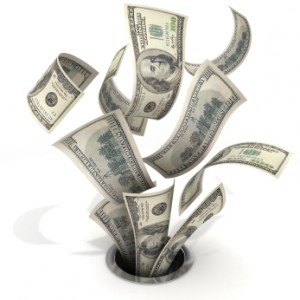Warning: Parameter 2 to wp_hide_post_Public::query_posts_join() expected to be a reference, value given in /home/fearlessmen/public_html/wp-includes/class-wp-hook.php on line 310
 Have you ever been in these shoes?
Have you ever been in these shoes?
Wells Fargo balance = $0
Piggy Bank = $0
Secret stash = It’s gone! Who took it?!
Living with no money is a painful situation to be in and it’s tough to get anywhere in these shoes. I don’t think any of us like being in a spot like this. What’s tougher is accepting the realization that one’s lack of finances is due to mismanagement and not the economy.
In my mid 20’s I realized that I didn’t know money at all. I wish the fault lied with the economy or someone else; it was me though. I liked money, but I didn’t respect it. I wanted more but even with a raise or bonus it seemed to disappear before I could even count it. It was as if check, before it even came in, was pre-allocated for that new laptop, TV or shiny rims for my beat up car. Yep, I thought the rims would make my old car look new. My financial plan at this time was work, get paid and do another 40 hours. Then buy something “shiny or new” to make myself feel better to stay in the rat race.
This was a vicious cycle and I wanted to break out of it. I was tired of living with no money. The good news was that I only needed to learn a few good financial habits that anyone could learn. The bad news was that I had a lot of bad habits to break. Life and finances had no recess or time out option and I would have to learn on the go – In the fast lane.
Creating and Managing My Budget
This was the first thing I had to learn. This involved keeping details of where all my money went. By doing this I’d be able to see where I was wasting it. Or maybe redirect it to something more important. Sometimes a purchase could be good but if compared to a higher priority is no longer the wiser choice.
Prioritizing My Budget
A lot of purchases I just didn’t need. I also wasn’t saving for retirement. I bought many new things that didn’t have long life spans and with my new perspective I no longer wanted them. If I didn’t need it than it went to the bottom of my list. Some things you don’t want to skimp on though. Daily essentials go to the top of the list. Along with rent, education and transportation.
Living Within My Means
This means those brand new shiny rims for an old car is a stupid purchase. After prioritizing your budget you’ll see what’s left over. Your priority list will help decide what to do with it.
Emotional purchases are the most dangerous. These you really got to watch out for.
Wait a little while and the price will come down. Sometimes when you wait you realize you don’t actually need or want it anymore.
Learn how money works and make it work for me.
Most retirement plans use compounding interest and learning this principle drastically changed my savings plan. If you want to master your finances you got to learn how money works.
Now the bad habits: Some were mine and some are good to watch out for
$5 coffee. This was my big spending that I just didn’t need. For others it could be something else. Identify what it is and make a change.
Fast food may be a faster meal but it’s also a faster way to empty your wallet. Make a grocery list and stick to it. You’ll save a lot here. Try couponing and keep an eye out for sales.
Eating out and Entertainment is pricey. It’s fun but not when your wallets empty. We do need to have fun with family, friends and significant other or spouse. But moderation is the key. There are a lot of cheaper options out there if you do your research.
Abusing credit cards / Carrying a balance. Thankfully I received some good advice on this one before I got my first credit card. In a few words here is what was shared with me. That credit line may seem like money to spend but it really isn’t. Treat that credit line as if it was a debt and if you plan to use it make a payment plan first.
Not saving and planning for retirement. If you want to work forever then you don’t need a plan. Otherwise, saving even $50 a month can make a big difference over 30 years. Create an automatic savings plan and treat it as money that was never yours.
Here are a few other hot items that can easily be cut down and eliminated:
Booze and cigarettes. Enough said.
If the recession isn’t to blame for your financial hardships then stand up, face it and be financially responsible. It really isn’t that hard if you absolutely want it. Remember that no plan is the fastest way to make your money disappear. Take some time now to plan and you’ll have more left over in the end.
You’re so right that we need to figure out how to improve our own financial habits before blaming others. We live in a society where passing the buck is second nature though. Instead of accepting responsibility, it is just so much easier to stick the blame on someone else.
It sounds like I had a lot of the same financial problems in my 20s as you. I didn’t run into credit card problems either, but I was definitely living in the moment and just not worrying about where my money was going. If I had the money and wanted something, I would buy it. Even if it was something wasteful such as excessive fastfood, pricey entertainment, nice restaurant meals, etc, I wouldn’t think twice.
You’re absolutely right, Jeremy! We need to be accountable for our actions. As a nation, from maybe our generation on down, I think less is expected of us as men and in a way facilitates running away from responsibility. This doesn’t help us or anyone one bit though in the long run.
You make a great point John. A lot of people are so quick to blame the economy for their poor financial condition. People need to realize though, they are ultimately the only ones responsible for their own well-being.
Thanks JW! Taking responsibility for ones actions both past, present and future isn’t always easy. But if done the results are tremendous.